What is a creative community?
A creative community describes a place-based cross-sector collaboration that brings together diverse partners around a shared challenge or opportunity with the aim of generating new cultural activity.
By focusing on collaborative research and development (R&D), the programme puts people at the centre of the innovation system. It identifies the needs of the community, empowering cross sector stakeholders to get involved in culture and research, and building skills, capacity, and consensus.
This method reflects the conceptualisation of Creative Communities as a change-making mechanism. It provides space to establish a new knowledge base that can better inform the very different policy landscapes that comprise our devolved nations and regions of the UK today.
Community resilience and culture
In her 2024 Labour conference speech as Culture Minister for Department for Culture, Media and Sport, Lisa Nandy underlined that ‘for far too long in communities up and down our country, too many voices have been ignored. Equal opportunity across the nation will help enrich our culture’.
By bringing people closer to opportunity – to gain skills, retrain, and retain talent in the regions and nations of the UK – culture is uniquely placed to forge much-needed societal resilience. The challenge now is to preserve what we have and create new culture, as well as ensuring that culture is by all, and for all, going forwards.
In May 2023, we published a report: By All, For All: The Power of Partnership. This report mapped for the first time the range and scale of non-academic partners and communities that have worked with AHRC to create new cultural opportunity and innovation across the last 10 years.
To action the recommendations of the report and catalyse its identified areas of growth, the Creative Communities team co-designed a series of new interventions. These enhance inclusive innovation and the delivery of cultural R&D within the devolved contexts of Scotland, Wales and Northern Ireland and the mayoral combined authorities of England.
UK Community Innovation Practitioners (CIPs)
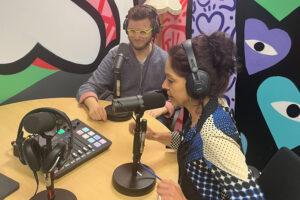
Georgina and Gaston at the podcast studio.
Credit: Creative Communities programme
In 2023, the Creative Communities programme launched the first CIP pilot. It awarded £290,000 to five CIPs – one in Scotland, Wales and England and two in Northern Ireland.
The CIPs have collectively worked with 17 partners across all four nations spanning government, private, public and third sectors and connected with over 120 community members.
It delivers new cultural R&D aimed at enhancing local belonging and social cohesion, and opening new access to collaborative R&D.
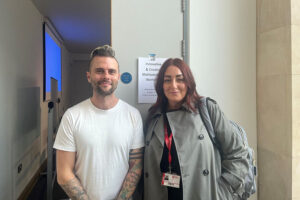
Jim and Aine at the Innovative and Creative Methodology workshop in Belfast.
Credit: Creative Communities programme
In a new podcast series, case studies and policy papers the CIPs profile the voices of communities that operate at the heart of innovation.
These new publications capture vital new knowledge on the power of diverse partnerships, co-creation, and the potential to shape and sustain resilient communities, as well as more inclusive models of innovation and R&D.
Allowing the CIPs, their cross-sector partners and communities to speak for themselves, they tell new stories about five very different creative communities from across the UK.
The CIP research profiles:
- the use of photography, poetry and drama to empower communities and break cycles of silence around trauma and substance use in Belfast (Áine Brady, Queens University Belfast)
- the role of heritage sites in fostering sustainable development in de-industrialised regions of South Wales (Alexander Langlands, Swansea University)
- the power of music to unite diverse communities in Liverpool (Georgina Aasgaard, University of Liverpool)
- collaborative filmmaking with skateboard communities to reignite civic pride and identity in Portrush (Jim Donaghey, Ulster University)
- the use of design-led tools to promote communication between arts and humanities academics and community partners in Glasgow (Gaston Welisch, University of Glasgow)
The CIP research also offers practical guidance for communities, academics, third and private sector organisations, and policymakers seeking to implement co-creation strategies to create new culture within their own communities and devolved contexts.
Co-creation nation: new funding 2025
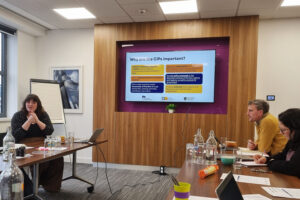
CIP midpoint meeting.
Credit: Creative Communities programme
Mariana Mazzucato recently made the case for co-creation as an economic and democratic good. Her inclusion of co-creation as a core pillar for the ‘common good’ focuses on how this method ‘allows citizens and stakeholders to participate in debate, discussion, and consensus-building that bring different voices to the table’.
Calling for more work to enable ‘genuine interfaces between the public sector, the private sector, and civil society to mobilise collective intelligence’, her economic approach advocates for a research ‘environment that allows everyone to participate and contribute to society’.
This approach to co-creation has been a core principle of the AHRC Creative Communities programme since 2022. In our new CIP podcast series, case studies and policy papers, our CIPs demonstrate the multiplicity of co-creation practices found in cross-sector arts and humanities R&D. These dynamic new research outputs also highlight the challenges and opportunities for the future of co-created, inclusive innovation.
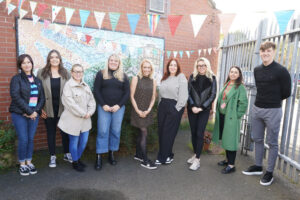
Katy visiting Aine in Belfast.
Credit: Creative Communities programme
Because when it comes to culture and R&D in devolved contexts, co-creation with cross-sector partners and communities really works, and we need more of it. That is why today we can announce that the AHRC Creative Communities programme has been extended to 2027 with an additional £1.7 million funding award.
These funds will be used to scale up the CIP programme for 2025 to 2026, doubling the number of opportunities for new CIPs.
To mark the launch of the CIP research, the extension funding and the brand-new CIP award call, the AHRC Creative Communities team will be hosting:
- virtual CIP showcase on 23 October 2024, 11:00am
- expression of interest webinar for potential applicants to the new funding award on 13 November 2024, 11:00am
Co-labs and policymaking
The Creative Communities programme aims to explore how and why engaging cross-sector partners in research, and communities as research partners, can enhance the quality, resilience, and sustainability of our research eco-system. The CIP pilot sits alongside other programme research, including the first survey of non-academic partners who have taken part in AHRC-funded research, as well as a series of policy labs that have fostered co-creation in cultural policymaking within devolved settings.
Our UK policy labs are creatively facilitated policy shops with devolved governments, policymakers, stakeholders and communities to explore new ways of using creativity as a tool for co-creating cross-sector solutions and networking innovation within devolved policy contexts.
Focusing on co-designed themes – skills, health and wellbeing, environment, belonging and civic Identity – the labs use culture as a lever to unlock the potential of devolved policy contexts in the UK. Discussions from these labs are captured through visual minutes by More Than Minutes, creating a valuable resource to inform and inspire future policymaking for culture and R&D in a context of devolution.
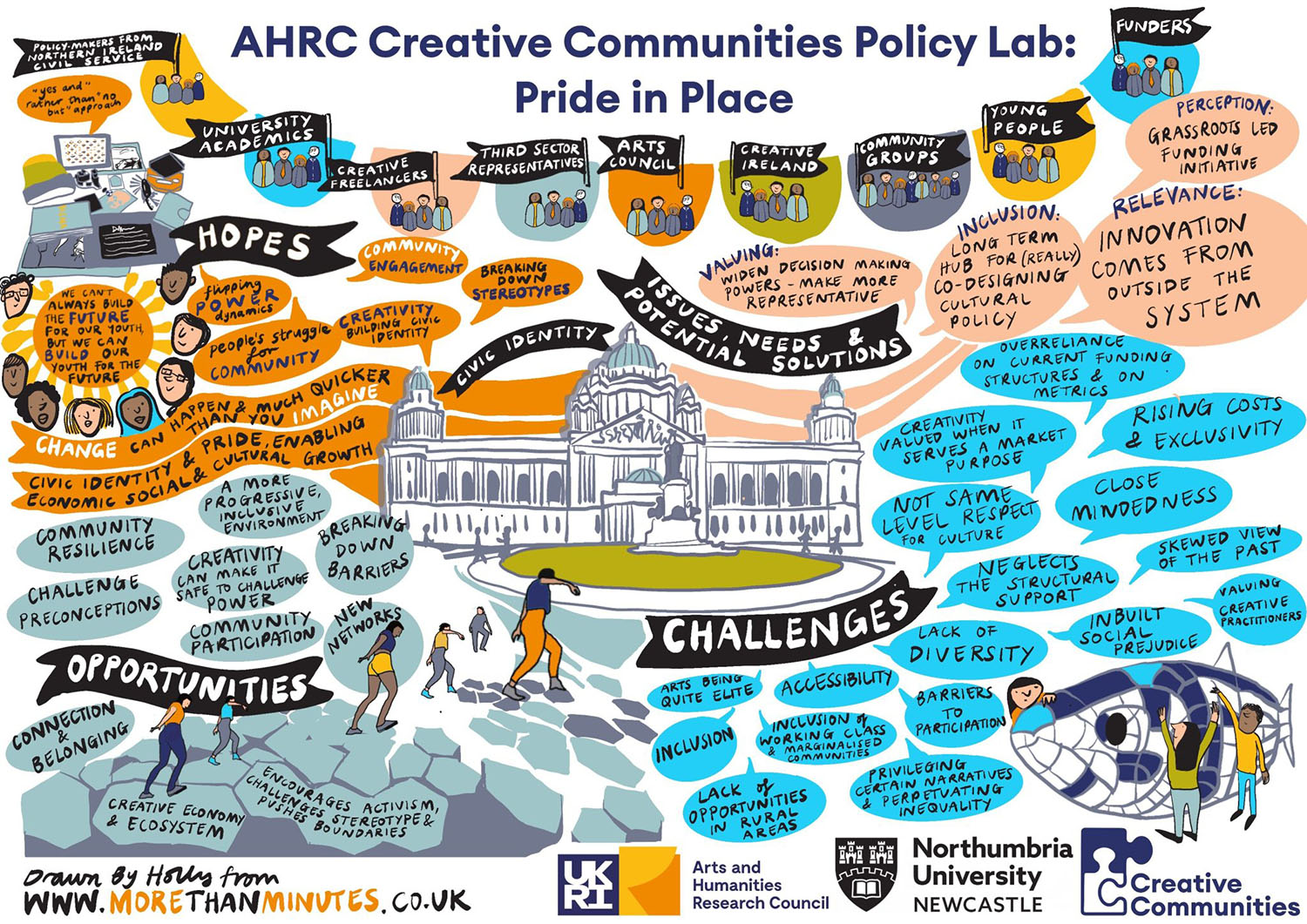
An artistic poster with a graphic of Belfast city hall, people crossing the Giant’s Causeway, and lots of different groups of cultural and community stakeholders. The poster is titled ‘AHRC Creative Communities Policy Lab: Pride in Place’. It was drawn by Holly from More Than Minutes. It has logos of AHRC, Northumbria University Newcastle and Creative Communities.
Credit: Creative Communities programme
Evidence from the policy labs is contributing to our new open policy forum, while collated evidence will inform four national policy sprints with devolved governments in winter 2024 to 2025. In spring 2025, final policy recommendations will be shared with UK government, devolved governments, funders and stakeholders.
A funding opportunity will go live in spring 2025 to commission four Creative Communities policy co-lab networks – one in each of the four nations of the UK – to create a space for cross-sector collaborative cultural policy ideas exchange in devolved regions and nations of the UK.
This opportunity will fund lab networks that operate physically and virtually to gather new cross-sector ideas on policymaking, to generate innovative solution to major challenges and opportunities in devolved contexts, and to explore the role of culture and R&D in promoting resilient and creative communities.
More details on the co-lab network funding opportunity will be published in spring 2025 on the Creative Communities website.
Devolution revolution: culture and R&D
Research doesn’t just happen in a lab: it happens on doorsteps and local neighbourhood streets, civic spaces and town centres, schools and hospitals, cities, coasts and countryside, through diverse digital and physical creative communities. In their pledge to ‘complete the map of devolution (PDF, 2.6MB)’, the new UK government and its missions can supercharge the role of culture and R&D in unlocking inclusive growth across our regions and nations.
To date, the Creative Communities programme has identified cross-sector co-creation as a characteristic trait of delivery in successful AHRC-funded R&D past and present: By All, For All: The Power of Partnership demonstrates a rich seam of cultural growth that runs across all four nations of the UK.
This new evidence base show how and why Creative Communities are a rich site of inquiry and a vital means of promoting growth and investment in a context of devolution and the new Labour government missions.
Through the CIP and lab interventions the programme has addressed knowledge gaps and responded to identified demand for co-creation opportunities in research and cross-sector collaboration in policymaking. Through our CIP podcast series, case studies, policy papers and a forthcoming new toolkit we are building the foundational resources to enable our extension award planning into the next phase of activity.
Our new CIP awards will help us go further and faster in delivering new cultural R&D with cross-sector consortia and will help make the case for culture at every level, from the local community centre to the House of Commons.
Keep up to date with programme developments, get involved and read more at Creative Communities.




